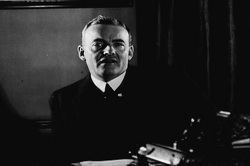By Sarah Robey
[We recently digitized a campaign film from the Adlai E. Stevenson Papers, located in our Public Policy Papers. The film, “Nuclear Test Ban,” was produced as a televised campaign program for Stevenson’s 1956 presidential bid against Dwight D. Eisenhower. The film speaks to an important transitional moment in the American encounter with nuclear weapons.]
With a deafening roar, a mushroom cloud blossoms on the screen. As viewers watch the cloud of smoke, dust, and water vapor take its awful form, a narrator declares, “this is the H-Bomb at work… This is the means for destroying all living things on earth.”
The scene cuts to Adlai Stevenson, Democratic candidate in the 1956 presidential election, as he makes his case to the American public for a ban on hydrogen bomb testing. Stevenson is quick to dispel the notion that his proposal is simply an election maneuver: the issue “was and it is too serious for that,” despite then-Vice President Richard Nixon’s assertion that a ban was “catastrophic nonsense.”
For the next twenty-three minutes, Stevenson and a group of experts in the field present a grim assessment of the possible consequences of America’s nuclear testing: sickness, war, and horrors unknown.
The film ends with Stevenson’s disquieting appeal: “I believe we must somehow guarantee mankind against the horrible destructiveness of the hydrogen bomb… I believe we have no alternative.”



